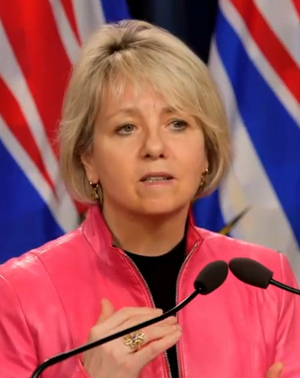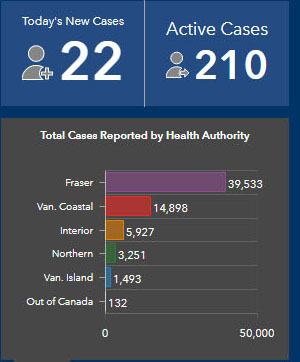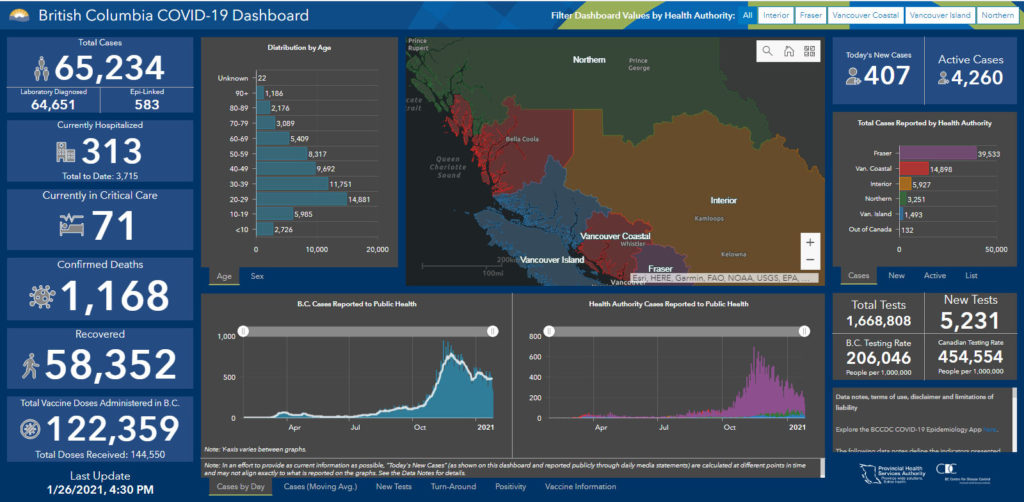Tuesday January 26, 2021 | VICTORIA, BC
by Mary P Brooke, B.Sc., editor | Island Social Trends
Today Provincial Health Officer Dr Bonnie Henry implores British Columbians to adhere to all the public health protocols.
And if you’re already doing that and asking what more you can do: “Be the voice of support and encouragement for those who may be wavering in their resolve,” she said in a statement today.
Those protocols which work in fighting COVID-19 are, of course well known after one year of the ongoing pandemic: keep your physical distance, wash your hands frequently, wear a mask in all public indoor spaces, stay home if not feeling well, and (since around mid-November 2020) socialize only with your own household bubble.

While many people are ‘COVID-fatigued’ from following these protocols, they are the strongest layers of protection that each individual can take. In business spaces there are the added measures of insisting upon physical distancing and mask-wearing by staff and customers, and the use of physical barriers like sheets of plexiglass. Where people can work from home they are presently asked to do so.
Somehow people have become accustomed to an average daily case count in the range of 500. Dr Henry says that’s too high, especially with the presence of variant viruses in BC. “It’s higher than we want it to be,” she says. Anything above that could overwhelm the health care system; anything below that is better, but still a lot (compared to the zero that we’re all aiming for once vaccines are fully rolled out).
“With each new case, we have the opportunity to stop the virus in its tracks, break the chains of transmission and bring our numbers down. Each of us has the ability to do that,” the Provincial Health Officer said today.
“There is no welcome mat for COVID-19,” said Health Minister Adrian Dix yesterday in the livestreamed Monday COVID briefing at 3 pm. He wants people to “heed and adapt to” the present reality, saying “this is the moment to uphold” the fight to bend the curve and reduce case numbers in BC.
“Our goal is clear — fewer cases in BC — as low as we can go.” The path is about “fewer faces and fewer places”.
Vaccines in BC:
More people will be protected in the short-term with one dose of available vaccines, by stretching Dose 2 to now 42 days., as outlined yesterday by Dr Henry This is in response to a lesser-than-expected supply of the mRNA vaccines by Pfizer-BioNTech last week, this week and next week. In total, to January 26, a total of 122,359 vaccines have been administered in BC (including 4,105 injections of second-dose).
The total supply received as of January 26 is 144,550 (including 26,775 doses received last week — comprised of 24,375 Pfizer and 2,400 Moderna).
The Pfizer vaccines are primarily being used in long-term care (residents and staff) while the Moderna vaccines are being shipped to rural and remote locations.
BC COVID case profile:
COVID-19 test-positive case count total in BC to January 26 is 65,234 (including 407 new in the last 24 hours). The current active case count is 4,260. Presently 6,450 people are self-isolating due to known exposure to COVID-19. Presently there are 313 people in hospital (71 in ICU).
There were 14 more deaths in BC in the last 24 hours due to COVID, bringing the total to 1,168 during the pandemic.
As of today January 26, now 122,359 vaccine doses (mRNA type – both Pfizer and Moderna) have been administered in BC (4,105 of those as Dose 2), from a total received supply of 144,550 doses.
Six diagnosed cases of MIS-C:
There have now been six diagnosed cases of multisystem inflammatory syndrome (MIS-C) in children in BC — as being directly associated with COVID-19 infection, as reported by Dr Henry yesterday. Three were girls and three were boys, in the age range of 1 to 15 years.
According to the Mayo Clinic, most children who become infected with the COVID-19 virus have only a mild illness. “But in children who go on to develop MIS-C, some organs and tissues — such as the heart, lungs, blood vessels, kidneys, digestive system, brain, skin or eyes — become severely inflamed. Signs and symptoms depend on which areas of the body are affected.”
“They have all recovered fully or are recovering,” said Dr Henry during her media briefing session.
The form used by doctors in BC to report MIS-C indicates the significant range of symptoms.
As well, Dr Henry reported that there have been 19 cases of inflammatory conditions described as Kowasaki’s, which are under investigation in BC. The affected children are up to age 17 years. None of those are associated with COVID-19, Dr Henry said.
New strains:
The COVID-19 variant strains known as the UK variant (B117) and the South African variant (B1351) have been found in testing the BC CDC — five cases and three cases, respectively.

The B117 infections were found to be related to travel or close contact with someone who had travelled. The B1351 infections were apparently not related to travel, which means they have happened due to community spread.
That worries Dr Henry, adding once again that BC has “plateaued” at 500 daily cases (the peak was in mid-November, but also high again earlier this month).
Vancouver Island COVID case profile:
COVID-19 test-positive case count total in Island Health (for Vancouver Island) to January 26 is 1,493 (22 new since yesterday). Current active case count is 210. Yesterday there were 16 people in hospital (five in ICU); today that’s down by one person in hospital to 15 (still five in ICU).
The highest number of overall cases of COVID-19 in Island Health has been in the central Vancouver Island region during the pandemic, including currently for active cases (lower counts in south and north).

There was one more COVID-related death on Vancouver Island over the past weekend, bringing the total to 18 during the pandemic (to January 25), and one more in the last 24 hours, bring the total to 19 (January 26). In total, 90 people have been hospitalized with COVID-19 in Island Health in the past year.
Long-haulers:
So far, the BC Centre for Disease Control does not present a tally for ‘long-haulers’ (people who are considered “recovered” but who continue to have health problems due to the COVID-19 infection).
There are very likely going to long-term health impacts and associated health-care costs in BC and across Canada for years to come, particularly affecting working-age adults which has a spinoff impact on the economy.

According to the Mayo Clinic, continuing impacts from COVID-19 infection include damage to lungs, heart and brain. This is primarily due to damage of blood vessels within those organs.





